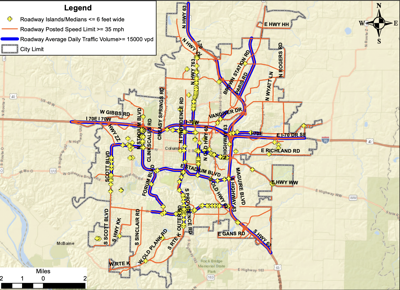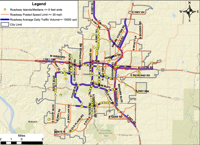COLUMBIA — Columbia City Council members are set to consider banning pedestrians standing on most medians across the city — a move that has worried some homeless outreach coalitions.

The ordinance, which comes after a pedestrian safety study commissioned by the city, targets 47 areas where pedestrians are considered unsafe.
"Special care should be given to regulating the use of medians and islands for pedestrian use in areas not specially designated for pedestrians," the study said.
The study suggests that the city ban pedestrian occupation if:
- The median is less than six feet wide
- The median is on a road that has more than 15,000 vehicles pass through a day
- The median is on a road with a speed limit of 35 mph or greater
Those three criteria cover most of the medians found across Columbia.
The study cites several pedestrian death statistics to back its suggestion. Over the past 10 years, researchers say pedestrian fatalities in Missouri have increased by 77%.
In Boone County, 76% of all fatal pedestrian-involved crashes have happened in Columbia, researchers said. Only 11% of those in the last decade have occurred at an intersection with a median.
Researchers said 15 intersections in Columbia have had more than three pedestrian-involved crashes, with five of those having a median.
By far and away, the most dangerous intersection was College Avenue and University Avenue, with 12 crashes involving pedestrians in the past 10 years.
Researchers argue these findings are grounds to ban pedestrians from medians on busy roads, if the city wants to achieve its goal of bringing the city to zero pedestrian traffic deaths.
Some homeless outreach programs, like the COMO Mobile Aid Collective, are finding issues in the ordinance for disproportionately affecting Columbia's homeless population.
"My first impression is that the folks who say that they're concerned about this is really they're concerned about visibility," COMO Mobile Aid Director Catherine Armbrust said. "Seeing people who are in extreme poverty or dealing with massive mental illness or addiction or other trauma that kind of leads to homelessness is incredibly challenging."
The ordinance would significantly reduce protections for people who panhandle for money on the medians. Armbrust said it adds to an already hostile culture against those without homes in the city.
"You're either told to move along or maybe you get smiled at and welcomed depending on the space, but a majority of folks get told to move along," Armbrust said. "There's not a real safe place in public for people to feel like they can exist and be accepted by a lot of the rest of the community. I think that that's incredibly heartbreaking."
Questions remain over how the Columbia Police Department would enforce the ordinance if it were to pass. Armbrust said it is critical to avoid pushing people without homes into a deeper cycle of poverty and crime.
"What does that mean if someone gets ticketed?" Armbrust said. "They then go back into the court system and it ends up snowballing and costing taxpayers a lot of money."
Armbrust said she hopes the city does more research before coming to a decision that could affect the people her group assists.
"We're talking about humans here," Armbrust said. "We're talking about humans who are experiencing a lot of really dreadful things. And so there's probably got to be a better way of solving some of these issues and just pushing them even more to the margins of society."
The city council passed the bill on first reading at a regular meeting Monday night. The council is now set to discuss and vote on the issue at a meeting on Monday, November 17.
Also at Monday night's meeting, the council passed a bill authorizing collaboration between the city and the state government to launch a program to support children from families affected by addiction or substance use.
The council also passed a bill on first reading to authorize the city to use funds from a state Blue Shield grant to purchase body armor for use by the police department. Blue Shield grants help cities purchase a variety of equipment for use by police departments. That bill will be up for vote at a meeting on Monday, November 3.




